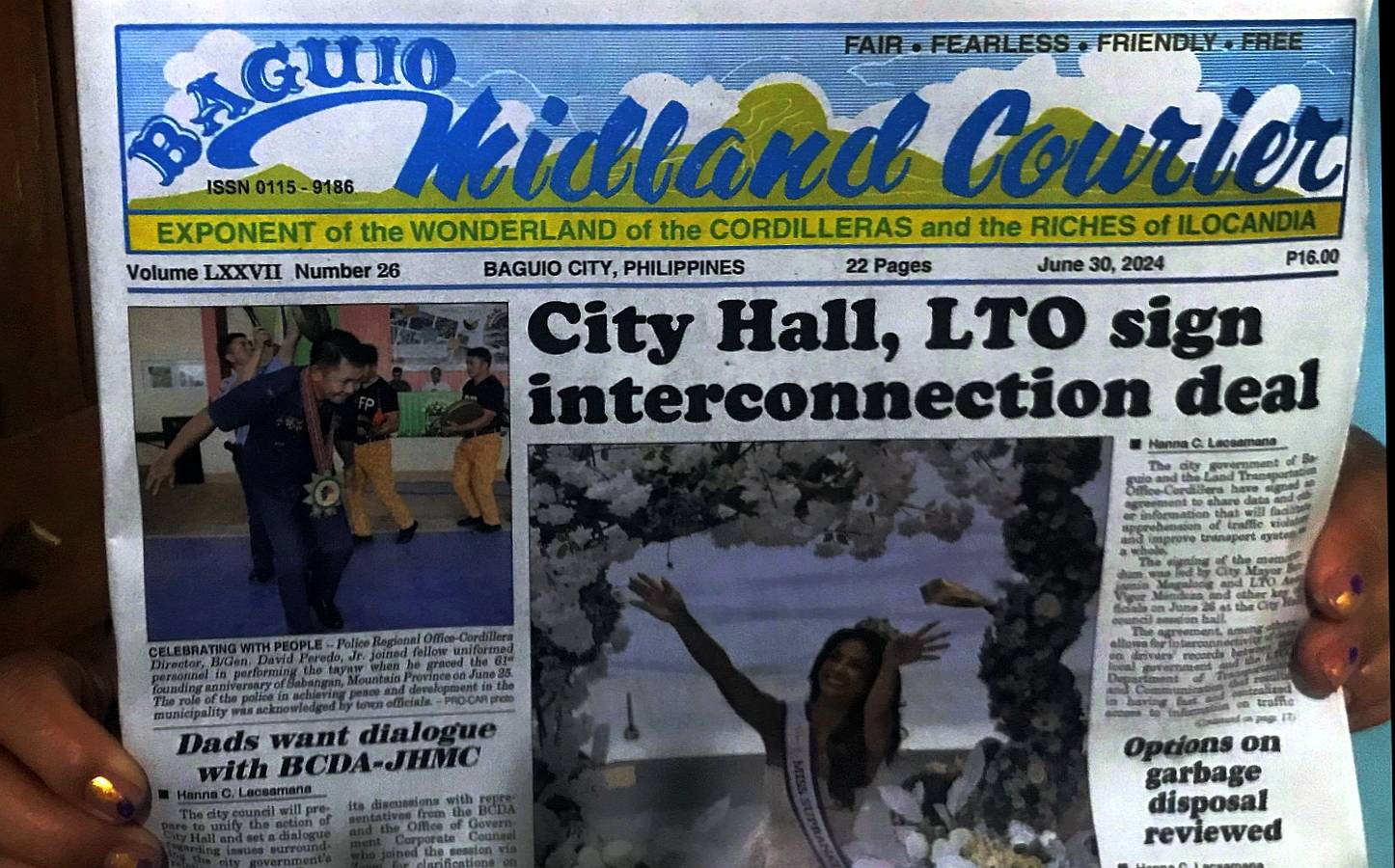BAGUIO CITY, Philippines — High publishing costs and a diminished city readership due to the overpowering influence of social media have led to the closure of the summer capital’s oldest newspaper, shocking many of the regular readers of the Sunday publication.
The Baguio Midland Courier, established in 1947 by respected Ibaloys, the late brothers Sinai and Oseo Hamada, announced in its latest Sunday edition and on its social media page that it would be publishing its last three editions in July after a 77-year run.
“The mission of its founding editors has always been to [be] ‘Fair, Fearless, Friendly and Free’ (which runs above the newspaper’s masthead) while delivering trustworthy and relevant news and information in this northern part of the country and in faraway lands reached by its online platforms,” the local newspaper said in a public announcement on Sunday.
READ: Rediscovering the love of reading newspapers in the digital age
“But [it] is not spared from the worldwide trend [where] newspapers face unprecedented challenges, leading to the closure of venerable publications,” it said, noting that it was still “hopeful that new opportunities will arise, allowing us to continue our mission in different forms.”
Midland Courier has the largest circulation among Baguio’s weekly newspapers, but it has struggled with high production costs that forced Baguio’s only daily newspaper, SunStar Baguio, to close in 2021, the second year of the COVID-19 pandemic.
Retiring workers
SunStar Baguio was the first newspaper to be published in Luzon by Cebu’s SunStar Network in 1995, and its former employees have been undergoing a labor conciliation process with Cebu’s business partners in Baguio over separation benefit claims.
Learning about Midland Courier’s decision, former SunStar reporter Malen Catajan said: “We hope the fates will be kinder to journalists and media workers [of the Courier].”
Catajan added: “May they get their rightful separation pay and benefits from the company they served for many years, and may they also find in their hearts the means to reinvent themselves after the closure [scheduled for July 22].”
Insiders said the benefits for about 30 employees, including their printers’ staff, had been worked out.
Some of the workers at the printing press had served the newspaper for 30 years and were nearing retirement when they were informed about Midland Courier’s impending shutdown, one of the Inquirer’s sources said.
The paper’s closure would leave behind comparatively younger weekly publications: the Baguio Chronicle, the Herald Express, the Northern Philippine Times and Amianan Balita Ngayon.
One of the newspaper’s last acts was to ensure that Baguio newsstands would continue to operate after its publisher, Gloria Antoinette Hamada, petitioned and got the approval of the Baguio City Council at its June 24 session to extend the news vendors’ special permits to operate in the downtown area from the previous six months to one year. Sidewalk vending has been prohibited on major city streets.
Sale
Sources said Midland Courier’s owners had considered selling the newspaper that began circulation on April 28, 1947, with 200 copies. However, the family dropped that option after examining the negative impact a new owner may have on the paper’s legacy, the same sources said.
Sinai and Oseo Hamada were the Japanese-Filipino sons of Josefa Cariño, one of the daughters of Mateo Cariño, who is celebrated for winning the landmark American Supreme Court decision in 1909 that recognized an indigenous Filipino’s “native title” over his properties.
Sinai is acclaimed in the literary world for the short story “Tabanatha’s Wife,” which was taught in high schools and colleges and was recently made into a 2018 movie. Oseo, father of the newspaper’s current publisher, served as the business manager of the Courier, while Oseo’s sister, Cecile Okubo Afable, served as its editor in chief until she died in 2012 at the age of 95.
The Hamadas’ Japanese descent had been an issue for some Ibaloys, particularly after the invasion by the Imperial Japanese Army in World War II, family members told the Inquirer. The Courier was Sinai’s brainchild two years after the war ended, but it was Oseo who handled its day-to-day business, Gloria Antoinette wrote in the newspaper’s 75th-anniversary edition in 2022.
Deep impact
Midland Courier was a Sunday routine for many Baguio old-timers, and its impending closure surprised residents.
“What kind of habit has reading the Courier become? I wish someone would come up with a Courier patch similar to nicotine patches which you slap on your arm to release small doses of [the newspaper] into your bloodstream until you stop craving it. Short of that, I don’t know how anyone can survive their withdrawal symptoms [when it closes],” said lawyer Joel Dizon, who once edited Midland Courier’s former rival, the defunct Gold Ore.
Helen Tibaldo, Cordillera director of the Philippine Information Agency and a close friend of the Hamada family, said losing Midland Courier “would deeply impact various aspects of the Baguio community [because it served] as a source of news, as a platform for Cordillera narratives, and as a training ground for aspiring journalists.”
Midland Courier’s archives, which date back to postwar Baguio, have been a rich source of information for historians and researchers.
Part of the Hamada family’s oldest newspapers had been digitized, and the earliest editions of the Midland Courier are in the US Library of Congress.
